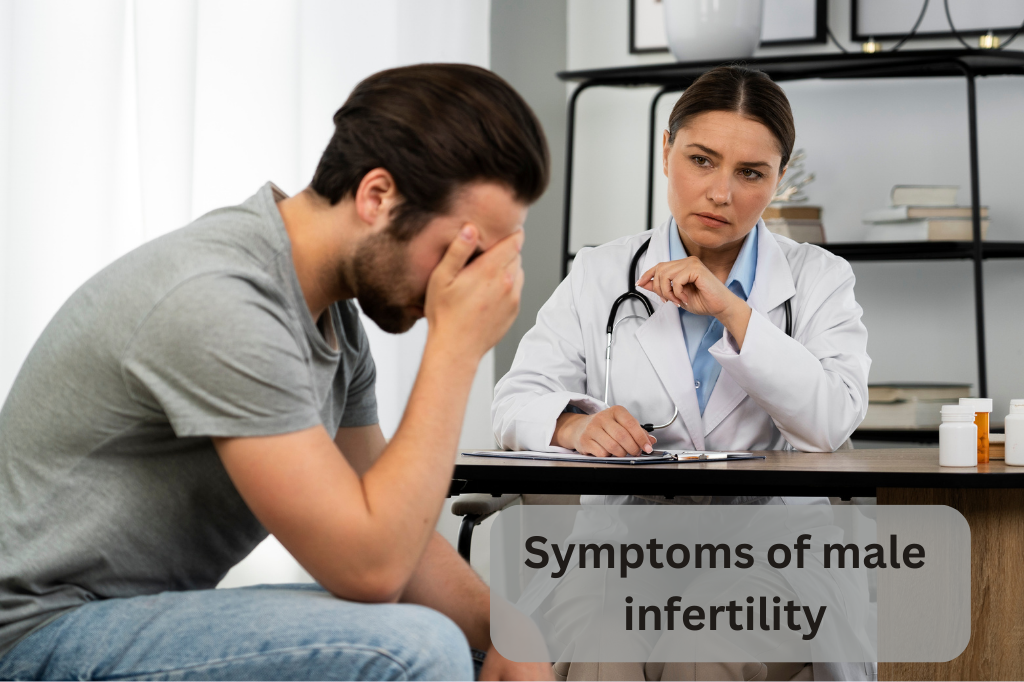Symptoms of male infertility
Nearly 1 out of 7 couples are infertile, implying they cannot conceive even after one year of unprotected intercourse. In half of such scenarios, male infertility plays a partial role. Male infertility is caused by low sperm count, abnormal sperm function, or blockage, which restricts sperm delivery. Some other factors like illness, lifestyle choices, and chronic health problems also lead to male infertility.
Infertility can be frustrating for many couples, but various treatments are available for male infertility.
Symptoms of male infertility
The main sign of male infertility is the inability to conceive, and this is the most obvious sign. In some conditions, problems like hormonal imbalance blocked passage, and dilated veins around the testicles can be the signs and symptoms. Below are some of the symptoms of male infertility which you can notice:
- Problems with sexual function: For instance, problems with ejaculation, less sexual desire, facing issues in maintaining an erection.
- Pain, lump, or swelling in the testicle area.
- Persistent respiratory infection.
- Abnormal breast growth
- Decrease in hair growth on the face.
Infertility warning signs male
Although erectile dysfunction is associated with stress, it can also happen because of reduced hormone levels. It never directly impacts sexual performance but creates trouble in sperm production.
Pain in testicles
If you have dilated veins in the scrotum or facing pain in the testicles, then you are probably suffering from varicocele. Such issues reduce sperm count and quality. If you are facing such symptoms, you must visit a doctor for a proper examination.
Discolored or bad smell ejaculate
Yellowish color or smell during ejaculation is another sign and symptom of infertility in males, and this may happen because of an infection in your prostate. Such infection can be a sexually transmitted disease (STD) or urinary tract infection (UTI). The color change and smell are often temporary, but if it persists for a longer duration, you must check with your doctor.
Small testicles
Small size testicles are associated with hypogonadism, a condition in which your testicles cannot produce enough sperm and testosterone. It will have an impact on your fertility. If you have such kind of trouble, you must consult your doctor.
Diagnosis of male infertility
Your doctor will check your medical history with a physical exam. Other tests to check male infertility involve:
- Sperm count: It is also called semen analysis; at least two semen samples are taken on two different days. Your semen and sperm will be checked under different criteria. It includes the quantity of semen you make, its uniformity, and its acidic level. Your doctor will also check your sperm quantity, mobility, and shape.
- Blood test: Through blood tests, your doctor may determine the hormone level to rule out other problems.
- Other tests: These involve imaging tests such as ultrasound to examine your testicles, scrotum structure, and blood vessels. Such tests are done to determine the issues in the male reproductive system.
- Testicular biopsy: If in semen analysis, few or no sperm are found, then your doctor will remove tiny tissue called biopsy from each testicle. These tissues will be monitored under a microscope.
Treatment of male infertility
The treatment depends on the reason behind the infertility
Fertility help
This treatment can help your partner to become pregnant through:
- Artificial insemination: In this procedure, healthy sperm are placed directly into the cervix entrance or the partner’s uterus. The sperm will then move toward the fallopian tube.
- IVF or other techniques: In this procedure, the doctor will collect your sperm and mix it with your partner’s egg. Such mixing can be done in the lab or the fallopian tube.
- Intracytoplasmic sperm injection (ICSI): A single sperm will be mixed with the egg. Fertilization will be observed under a microscope, and the fertilized egg will be placed in the partner’s uterus.
Medicine
If male infertility is due to a hormonal disorder, it can be treated through hormone treatment. Such hormone imbalance disturbs sperm development. Such imbalance may happen because of problems in the testes, pituitary gland, or hypothalamus.
Surgery
Surgery is done to fix problems restricting sperm from being made, matured, and ejaculated. Surgery can remove swollen or twisted veins in the scrotum, which may improve sperm quality.
Conclusion
You must consult your doctor if you cannot conceive after one year of unprotected intercourse. You can even seek advice sooner if you have the below-mentioned problem:
- Problems in erection or ejaculation, low sex desire, or other sexual function problems.
- Lump, pain, and discomfort in the testicle area.
- History of sexual problems.
- Undergone any scrotum, testicle, or penis surgery.
- If a partner is over 35 years of age.
Look for low-cost fertility clinics and check their reputation if you want to treat your infertility in the best possible manner.

